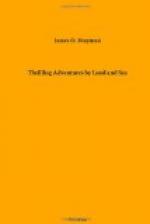“Why, don’t you know me?” in a mumbling, half-indistinct, and forced manner, said the man, still shaking our hand vigorously. “I’m Waters.”
And Waters it was, in reality, looking as well and as healthy as ever, without showing the least outward sign that he had ever caught a grape-shot in his mouth. A luxuriant growth of mustaches completely covered his upper lip, and concealed any scar the iron missile might have made; an imperial on his under lip hid any appearance of a wound at that point; and, with the exception of his speech, there was nothing to show that he had ever received the slightest injury about the face. His tongue, which was terribly shattered, was still partially benumbed, rendering articulation both difficult and tiresome; but he assured us he was every day gaining more and more the use of it, and, in his own words, he was soon to be “just as good as new”
It is needless to say that we were glad to see him—to meet one we had never expected to encounter again in such excellent plight. Any one who could have seen him sitting in that apartment of the Bishop’s Palace, his face swollen, and, with a gravity of countenance, which would have been ludicrous, even to the causing of laughter, had it not been for his own precarious situation, and the heart-rending scenes around, would have been equally as much astonished and rejoiced, as we were, on again so unexpectedly beholding him.
A correspondent of the “Inquirer” has sent us the following, which is quite as remarkable as either of the foregoing:
Very extraordinary incidents have been published lately, of shot having been caught in the mouths of soldiers, in the course of battle, in the war of 1812, and in the Mexican war; but an incident, perhaps more remarkable, for the coolness of the individual on the occasion, occurred at the battle of Fort Drane, fought, in August, 1837, under the command of the late Col. B.K. Pierce. This was one of the most signal and desperate engagements of that bloody war. The Seminoles, under their renowned chief, Osceola, had taken a very commanding position in an extensive sugar field, near the stockade, strengthened on the east side by a dense hammock. Three desperate onsets were made during the battle, and the enemy were finally driven from the field to the protection of the hammock. During the hottest of the battle, a soldier belonging to the detachment under the command of Lieut. Pickell, whose position was a little in advance of the two wings, of the name of Jackson, having just fired, received a shot from a tall Indian, not twenty yards distant, which broke through the outer parts of his pantaloons, and lodged in his right-hand pocket. Feeling the slight sting of the half-spent ball, he thrust his hand in his pocket, drew out the bullet, and dropped it into the barrel of his musket, upon the charge of powder he had just before put in; then, with the unerring aim of a true marksman, leveled his piece, and, as quick as lightning, his adversary was measured upon the ground. The wound was fatal—the warrior survived the shot but a few minutes.




